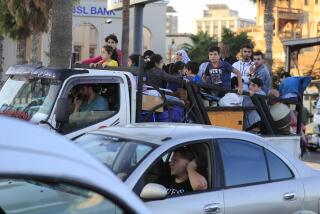Libyan regime defiant as protests swell
- Share via
Reporting from Cairo — Protesters have seized control of Benghazi and several other eastern towns, Libyan leader Moammar Kadafi’s son acknowledged in comments broadcast early Monday, but he vowed that security forces would fight efforts to end his father’s four decades in power “to the last bullet.”
Human rights groups said the death toll in Libya had exceeded 200 after six days of unrest. Police and government-hired mercenaries Sunday shot mourners for three dozen activists killed by police the previous day, according to video and online accounts trickling out of Libya. There were reports of government snipers firing on demonstrators from rooftops in Benghazi.
The day’s events shook Kadafi, a mercurial leader who was an implacable foe of the United States until he made overtures to the West in 2003. Elsewhere, the tide of protest across the Middle East swelled in capitals from Morocco on the Mediterranean to Bahrain in the Persian Gulf, both ruled by pro-Western leaders. In Yemen, some legislators and regional officials quit the ruling party because of a crackdown by President Ali Abdullah Saleh.
In a sign of growing U.S. concern, Adm. Michael G. Mullen, chairman of the Joint Chiefs of Staff, began a weeklong trip to for talks with U.S. allies, including Saudi Arabia, Qatar, United Arab Emirates, and Kuwait.
Oil-rich Libya has been closed to outsiders and authorities have restricted Internet and phone access.
Appearing after midnight on state television, Kadafi’s son Seif Islam denied rumors that his father had fled the country, saying without elaborating that he was still in Libya.
He said the military had made mistakes in confronting demonstrators, but would remain loyal. He blamed the unrest on foreigners, Islamists and criminals, who he said are plunging the country into civil war and destroying its oil wealth.
Demonstrators had taken control of Benghazi and other eastern towns, Seif Islam said, but vowed that the government would “fight until the last man, the last bullet” to crush the revolt.
He offered to engage dissidents in an “historic national initiative.” It was not clear when the remarks were recorded.
Protesters in the capital, Tripoli, contacted by Al Jazeera news channel and the British Broadcasting Corp. said early Monday that security forces seemed to be retreating from some parts of the city, and that demonstrations there were growing.
In comments earlier, analyst Amr Chobaki of the Al Ahram Center for Political and Strategic Studies in Cairo said that Kadafi was in control of Tripoli, but had lost Benghazi, Libya’s second-largest city, and much of the east to the protesters.
“It puts him in a very bad situation,” Chobaki said.
Human Rights Watch said Sunday that based on information from hospital sources, the death toll was at least 233. Amnesty International accused Kadafi of trying to put down the protests “virtually at any cost.”
In Benghazi and other towns, according to accounts on social network websites, demonstrators chanted, “The people demand the removal of the regime!” — the same chants that rallied protesters in successful revolutions in Tunisia and Egypt.
But unlike those two North African nations, Libya is a tribal society. The army and security services are structured on tribal loyalties, making it less likely that the military will follow the non-confrontational approach of Egypt’s professionally-trained army.
Amnesty International said bodies in Benghazi bore gunshot wounds in the head, chest and neck, indicating that security forces were shooting to kill. Some Libyan websites reported that Benghazi hospitals were putting out emergency calls for medicine and supplies after treating waves of victims over the weekend.
Benghazi and other eastern cities have long been hotbeds of unrest. In 1996, Kadafi’s security forces massacred a reported 1,000 prisoners at Abu Lim prison in Benghazi, and anti-government anger has simmered since.
In Sana, the Yemen capital, 11 members of parliament withdrew from Saleh’s ruling party, and several government officials in the city of Taiz resigned over the weekend in moves that may indicate a sea change in Yemen’s ongoing political unrest.
“The regime must respond to the people’s demands, or we will be casualities in an earthquake of change,” said Ali Mamari, a member of parliament who defected from the president’s party on Sunday.
Staff writers David S. Cloud in Washington, Borzou Daragahi in Rabat, Morocco, and Ned Parker in Manama, Bahrain, and special correspondents Haley Sweetland Edwards in Sana, Yemen, Amro Hassan in Cairo and Meris Lutz in Beirut contributed to this report.
More to Read
Sign up for Essential California
The most important California stories and recommendations in your inbox every morning.
You may occasionally receive promotional content from the Los Angeles Times.















